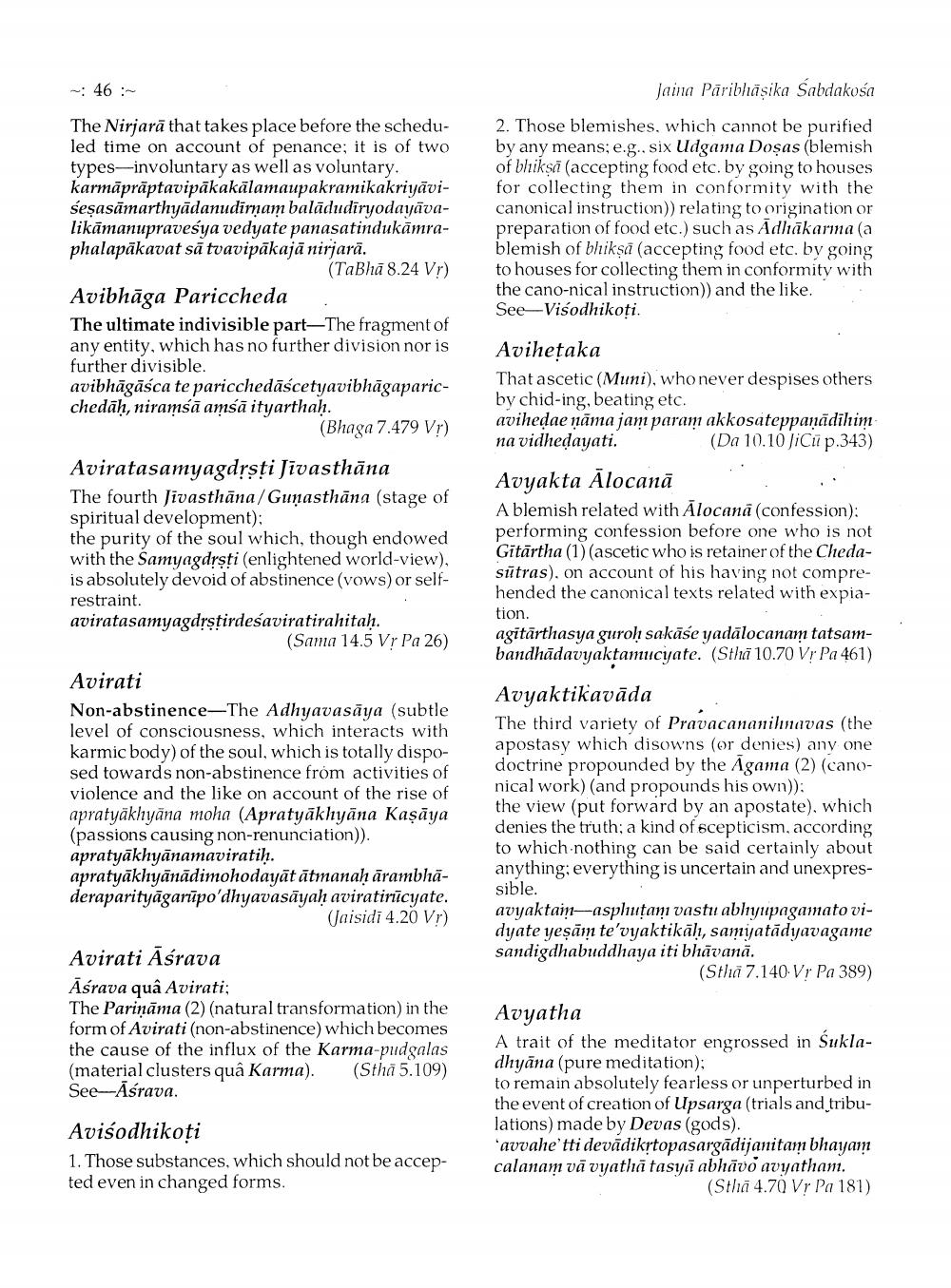________________
~:46:~
The Nirjara that takes place before the schedu led time on account of penance; it is of two types-involuntary as well as voluntary. karmäpräptavipäkakālamaupakramikakriyāvi
seṣasamarthyadanudīmṇam balādudīryodayāvalikamanupravesya vedyate panasatindukamraphalapákavat sa tvavipäkajā nirjară.
(TaBha 8.24 Vr)
Avibhāga Pariccheda
The ultimate indivisible part-The fragment of any entity, which has no further division nor is further divisible. avibhāgasca te paricchedāścetyavibhāgaparicchedaḥ, niramsa amsa ityarthah.
(Bhaga 7.479 Vr)
Aviratasamyagdṛṣṭi Jivasthana
The fourth Jivasthana/Gunasthana (stage of spiritual development):
the purity of the soul which, though endowed with the Samyagdrsti (enlightened world-view). is absolutely devoid of abstinence (vows) or selfrestraint.
aviratasamyagdrştirdeśaviratirahital.
Avirati
(Sama 14.5 Vr Pa 26)
Non-abstinence-The Adhyavasaya (subtle level of consciousness, which interacts with karmic body) of the soul, which is totally disposed towards non-abstinence from activities of violence and the like on account of the rise of apratyakhyāna moha (Apratyakhyāna Kaṣāya (passions causing non-renunciation)). apratyakhyanamaviratih. apratyakhyänädimohodayat ätmanaḥ ärambhäderaparityaganipo'dhyavasayah aviratiricyate. (Jaisidi 4.20 Vr)
Avirati Āśrava
Aśrava quâ Avirati;
The Parināma (2) (natural transformation) in the form of Avirati (non-abstinence) which becomes the cause of the influx of the Karma-pudgalas (material clusters quà Karma). (Stha 5.109) See-Asrava
Aviśodhikoți
1. Those substances, which should not be accepted even in changed forms.
Jain Paribhasika Sabdakosa
2. Those blemishes, which cannot be purified by any means; e.g.. six Udgama Dosas (blemish of bliksi (accepting food etc. by going to houses for collecting them in conformity with the canonical instruction)) relating to origination or preparation of food etc.) such as Adläkarma (a) blemish of bliksa (accepting food etc. by going to houses for collecting them in conformity with the cano-nical instruction)) and the like. See-Visodhikoti.
Aviheṭaka
That ascetic (Muni), who never despises others. by chid-ing, beating etc. avihedae nama jam param akkosateppaṇadihim na vidhedayati. (Da 10.10 JiC p.343)
Avyakta Älocană
A blemish related with Alocana (confession): performing confession before one who is not Gitartha (1) (ascetic who is retainer of the Chedasūtras), on account of his having not comprehended the canonical texts related with expiation.
agitärthasya guroḥ sakäse yadalocanam tatsambandhädavyakṭamucyate. (Sth 10.70 Vr Pa 461)
Avyaktikavāda
The third variety of Pravacananihnavas (the apostasy which disowns (or denies) any one doctrine propounded by the Agama (2) (canonical work) (and propounds his own)): the view (put forward by an apostate), which denies the truth; a kind of scepticism, according to which nothing can be said certainly about anything: everything is uncertain and unexpres
sible.
avyaktain-asphutam vastu abhyupagamato vidyate yeṣām te'vyaktikāḥ, samijatādyavagame sandigdhabuddhaya iti bhavana. (Stl 7.140 Vr Pa 389)
Avyatha
A trait of the meditator engrossed in Sukladhyana (pure meditation);
to remain absolutely fearless or unperturbed in the event of creation of Upsarga (trials and tribulations) made by Devas (gods).
avvahetti devadikṛtopasargādijanitam bhayam calanam va vyatha tasya abhavo avyatham. (Stha 4.70) Vr Pa 181)




